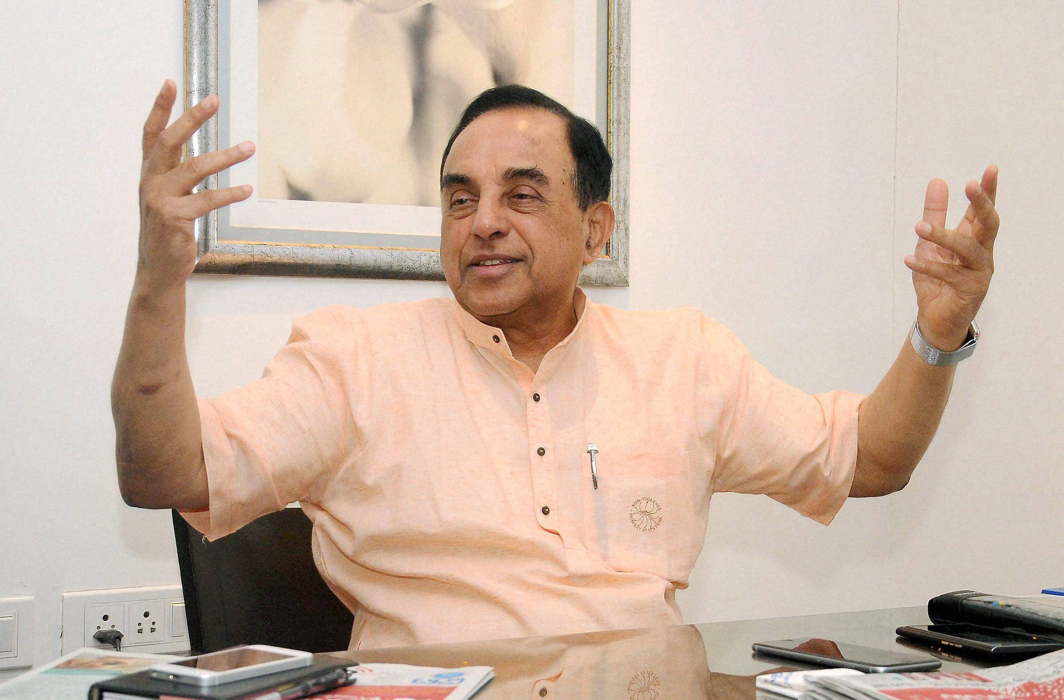[vc_row][vc_column][vc_column_text]Court witnessed heated arguments between Swamy and Justices S Muralidhar and IS Mehta who told him to be extremely circumspect in sharing petitions with media
The Delhi High Court, on Thursday, dismissed the public interest litigation (PIL) filed by BJP MP Subramanian Swamy seeking a court-monitored SIT investigation into the mysterious death of Sunanda Pushkar, wife of Congress MP Shashi Tharoor.
Questioning the locus standi of Swamy in the case and strongly chastising him for the allegations he made against Shashi Tharoor and the Delhi Police, the Division Bench of Justices S Muralidhar and IS Mehta also asked the BJP MP and his co-petitioner Ishkaran Bhandari to “be extremely circumspect in placing such a petition in the public domain even before it is properly considered by the Court”.
The judges were peeved at the fact that Swamy had reportedly made his entire petition public, through his social media accounts and the media a day before it was first heard by the court on July 12, 2017.
Through the proceedings of the case on Thursday, Swamy and the Bench entered into heated arguments with the former often attempting to emphasise on his understanding on the law and his social profile – that of a former law minister of India. The Bench was clearly not impressed with Swamy’s arguments and during verbal observations – and later in the written order too – said that his petition “is perhaps a textbook example of a ‘political interest litigation’ dressed up as a PIL”.
At one point during the arguments, Subramanian Swamy told the judges: “This is not my first PIL. I have appeared before many courts. I have filed several petitions in the past. Many of them are reported judgments and I have been successful in most of them. I have also been the Law Minister of the country.”
While the court kept insisting that it wanted to hear the case on the basis of facts and merits and sought Swamy to furnish evidence to support his claims of the Delhi police botching up the investigation into Pushkar’s mysterious death at the behest of Tharoor, who was a union minister at the time of his wife’s demise, the BJP leader failed to present any document to support his allegations.
In its verdict, the court noted: “Nothing has been placed on record (by Swamy) to probablise, let alone substantiate, the vague and sweeping allegations made in the petition. Dr. Swamy was asked whether he had any basis for alleging that the investigation was “botched” by the Delhi Police at the “behest of rich and influential”. He was also specifically asked if, indeed, he had any information in his possession as to who these persons are. In response, Dr. Swamy stated that he would file a further affidavit to substantiate the above as well as other sweeping allegations referred to hereinbefore (sic).”
The Bench went on to say in its order that: “The failure by Dr. Swamy to disclose the full facts and information in his possession, assuming that his assertion in this regard is right, is a fatal lapse. It is contrary to the assertion made by him in the affidavit.”
The court then came down heavily on Swamy, who it said “likes to be thought of as a veteran PIL petitioner”.
Terming his petition as a “textbook example of a political interest litigation”, the Bench said: “The Court should be careful in not letting the judicial process be abused by political personae for their own purposes… That is not to say that no political person can file a PIL. It is only that, in such instances, particularly where the principal allegations are against political opponents, the Court should be cautious in proceeding in the matter.”
In an effort to ensure that petitioners in future do not file PILs like the one filed by Swamy in the Sunanda Pushkar death case, the Bench ordered: “hereafter every writ petition (which includes a PIL petition) filed in the Registry (and not obviously a letter or post card) should be supported by an affidavit which, apart from complying with the legal requirements in terms of the governing Rules of the High Court, should clearly state which part of the averments (with reference to para numbers or parts thereof) made (including those in the synopsis and list of dates and not just the petition itself) is true to the Petitioner’s personal knowledge derived from records or based on some other source and what part is based on legal advice which the petitioner believes to be true.”
While the sternly worded order of the court left Swamy with little to say in the courtroom, the BJP leader – with his reputation for making outlandish claims on a variety of issues – took to Twitter later in the day to rant against the setback her received from the Delhi High Court and also to take a dig at his detractors.[/vc_column_text][vc_raw_html]JTNDYmxvY2txdW90ZSUyMGNsYXNzJTNEJTIydHdpdHRlci10d2VldCUyMiUyMGRhdGEtbGFuZyUzRCUyMmVuJTIyJTNFJTNDcCUyMGxhbmclM0QlMjJlbiUyMiUyMGRpciUzRCUyMmx0ciUyMiUzRU5vJTIwanVkZ2UlMjBub3JtYWxseSUyMHdvdWxkJTIwcmVmdXNlJTIwJTIwYSUyMHBldGl0aW9uZXIlMjB0aW1lJTIwdG8lMjBmaWxlJTIwYW4lMjBhZmZpZGF2aXQlMjBvZiUyMGZhY3RzJTIwYXNrZWQlMjBieSUyMGNvdXJ0Lk11cmxpZGhhcmFuJTIwSiUyMHJlZnVzZWQlMjZhbXAlM0IlMjBkaXNtaXNzZWQlMjBTdW5hbmRhJTIwY2FzZSUzQyUyRnAlM0UlMjZtZGFzaCUzQiUyMFN1YnJhbWFuaWFuJTIwU3dhbXklMjAlMjglNDBTd2FteTM5JTI5JTIwJTNDYSUyMGhyZWYlM0QlMjJodHRwcyUzQSUyRiUyRnR3aXR0ZXIuY29tJTJGU3dhbXkzOSUyRnN0YXR1cyUyRjkyMzQ4ODk1MDkzNjg1MDQzMiUzRnJlZl9zcmMlM0R0d3NyYyUyNTVFdGZ3JTIyJTNFT2N0b2JlciUyMDI2JTJDJTIwMjAxNyUzQyUyRmElM0UlM0MlMkZibG9ja3F1b3RlJTNFJTBBJTNDc2NyaXB0JTIwYXN5bmMlMjBzcmMlM0QlMjJodHRwcyUzQSUyRiUyRnBsYXRmb3JtLnR3aXR0ZXIuY29tJTJGd2lkZ2V0cy5qcyUyMiUyMGNoYXJzZXQlM0QlMjJ1dGYtOCUyMiUzRSUzQyUyRnNjcmlwdCUzRQ==[/vc_raw_html][vc_raw_html]JTNDYmxvY2txdW90ZSUyMGNsYXNzJTNEJTIydHdpdHRlci10d2VldCUyMiUyMGRhdGEtbGFuZyUzRCUyMmVuJTIyJTNFJTNDcCUyMGxhbmclM0QlMjJlbiUyMiUyMGRpciUzRCUyMmx0ciUyMiUzRUFsbCUyMER1YmFpJTIwZG9uJTI2JTIzMzklM0JzJTIwc3VwcG9ydGVycyUyMGFuZCUyMG9uJTIwaGlzJTIwb24lMjBwYXlyb2xsJTIwYXJlJTIwY2VsZWJyYXRpbmclMjBIQyUyMGRpc21pc3NhbCUyMG9mJTIwbXklMjBQSUwuJTIwV2h5JTNGJTIwV2h5JTIwdGhlJTIwc2lnaCUyMG9mJTIwcmVsaWVmJTNGJTNDJTJGcCUzRSUyNm1kYXNoJTNCJTIwU3VicmFtYW5pYW4lMjBTd2FteSUyMCUyOCU0MFN3YW15MzklMjklMjAlM0NhJTIwaHJlZiUzRCUyMmh0dHBzJTNBJTJGJTJGdHdpdHRlci5jb20lMkZTd2FteTM5JTJGc3RhdHVzJTJGOTIzNDg5NzY1ODM5NjgzNTg0JTNGcmVmX3NyYyUzRHR3c3JjJTI1NUV0ZnclMjIlM0VPY3RvYmVyJTIwMjYlMkMlMjAyMDE3JTNDJTJGYSUzRSUzQyUyRmJsb2NrcXVvdGUlM0UlMEElM0NzY3JpcHQlMjBhc3luYyUyMHNyYyUzRCUyMmh0dHBzJTNBJTJGJTJGcGxhdGZvcm0udHdpdHRlci5jb20lMkZ3aWRnZXRzLmpzJTIyJTIwY2hhcnNldCUzRCUyMnV0Zi04JTIyJTNFJTNDJTJGc2NyaXB0JTNF[/vc_raw_html][/vc_column][/vc_row]


 Latest world news13 hours ago
Latest world news13 hours ago
 India News13 hours ago
India News13 hours ago
 Latest world news13 hours ago
Latest world news13 hours ago
 Latest world news13 hours ago
Latest world news13 hours ago
 India News12 hours ago
India News12 hours ago















